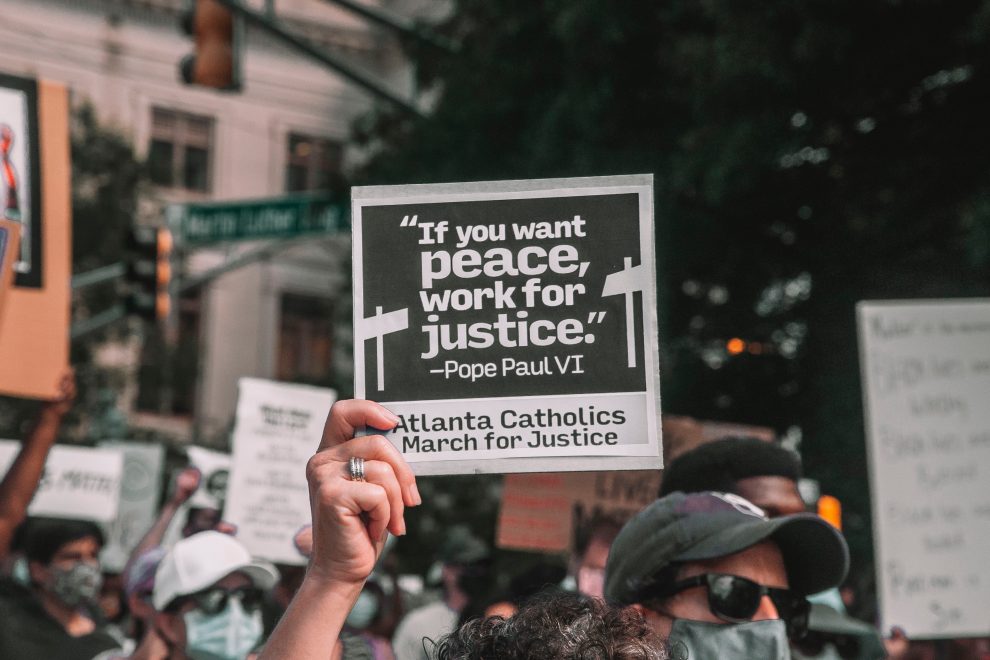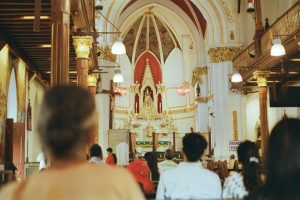Political commentator Glenn Beck famously stated, “I beg you, look for the words social justice or economic justice on your church website. If you find [them], run as fast as you can. Social justice and economic justice, they are code words.” For many Catholics searching for parishes, Beck is correct. These are code words they hope to find in an active church, albeit not for the reasons Beck warns against. While Beck equates social justice with communism and warns that politics and religion don’t mix, Catholic communities and the global church beg to differ. Social justice is, in fact, a bedrock of Catholic practice and the very reason many individuals choose their parish or become Catholic.
Social justice refers to our earthly attempts to work toward the kingdom of God, which Jesus so often preached about to the crowds. As we follow Christ and his work, we work toward a society that upholds the dignity of all people and in which all can flourish, especially the most poor and vulnerable. This last piece is so critical that the United States Conference of Catholic Bishops (USCCB) calls the preferential option for the poor a “basic moral test” for our communities: “In a society marred by deepening divisions between rich and poor, our tradition recalls the story of the Last Judgment (Matt. 25:31–46) and instructs us to put the needs of the poor and vulnerable first.”
Generally, most parishes focus almost entirely on charitable works: soup kitchens, clothes closets, and drives to collect needed items for impoverished communities. While this crucial work provides temporary relief to many families, the call from Jesus and from our bishops is even more urgent: the work of justice in addition to charity.
Charity feeds those who are poor, clothes the naked, and visits the sick. Justice, on the other hand, asks why such poverty and inequality exist in the first place. Perhaps Beck knew of Brazilian Archbishop Hélder Câmara’s famous line: “When I give food to the poor, they call me a saint. When I ask why the poor are hungry, they call me a communist.” It is political work and therefore dangerous—the same way that Jesus was such a danger to first-century society that he was executed by the state. So how can parishes engage in this reordering of society that is potentially divisive?
For Nondas Hurst Voll, a longtime parishioner at the Church of Saint Michael the Archangel in one of the poorest neighborhoods in Rhode Island, social justice is a bedrock of her faith and the very reason she joined the parish. The historical church, located in south Providence, is home to people from all over the world. Masses are offered in English, Haitian Creole, Hmong, Kirundi, and Spanish. Outreach includes a food pantry, tutoring, and heating assistance.
When I give food to the poor, they call me a saint. When I ask why the poor are hungry, they call me a communist.Archbishop Hélder Câmara
But Hurst Voll and others at St. Michael go beyond offering works of charity. They live out Martin Luther King Jr.’s vision of the “Beloved Community.” For more than 40 years, “the parish has been a hotbed of social justice work,” Hurst Voll says. Members and staff have founded numerous nonprofit organizations. ¡CityArts! works with inner-city children by using art as a medium for social change. The Nonviolence Institute directly tackles street and gang violence by offering workshops and trainings on peace and direct action. The Dorcas International Institute works in refugee resettlement and immigration services. Amos House focuses on job training and addiction recovery. The parish has hosted the Nuns on the Bus tour. Laypeople often gather to read documents on Catholic social teaching to ground themselves in faith before moving to action, such as in a recent group on Laudato Si’ (On Care for Our Common Home).
For St. Michael and other parishes excelling at the call to social justice, it’s not just about the external work of alleviating poverty and promoting stewardship of the Earth. They embody the model of the Beloved Community in who they are. They respond to the needs put before them in any given moment, just as Gaudium et Spes (The Church in the Modern World) invites us to do: “To carry out such a task, the Church has always had the duty of scrutinizing the signs of the times and of interpreting them in the light of the Gospel.”
For parishes to excel at practicing social justice means to engage with the community.
As our society weathers the current storms of COVID-19, the curtain has been pulled back on radical inequality that exists in our own country and in our own parishes. Loss of employment, access to health care, and isolation present challenges ready to be tackled by the church and all those faithful to Jesus’ model of radical communal care.
For parishes to excel at practicing social justice means to engage with the community. As their guiding question, they should ask themselves, “Who are the most vulnerable members of this community here and now?” Including the most vulnerable in decision-making restores human dignity and helps avoid the savior complex that is often a danger in mission work. Empowering the powerless topples the injustice of society and lives the Beatitudes in the here and now.
Asking Câmara’s questions is also crucial: Why are these the most vulnerable populations? What structures and policies need to be redeemed for their flourishing? Finally, communities need to keep their outreach and social justice work always grounded in faith through scripture, prayer, and the call to serve and stand in solidarity. We pray with our hands and our feet as well as with our lips and our hearts. This is key for Hurst Voll when she speaks about the outreach and the study that parishioners do together: “I’m just one of thousands of people who have followed [those] who have laid the groundwork. . . . This is worship as well.”
This article also appears in the August issue of U.S. Catholic (Vol. 85, No. 8, pages 18-19). Click here to subscribe to the magazine.
Image: Unsplash













Add comment